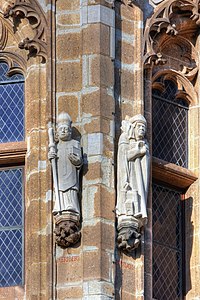Heribert of Cologne
| Heribert of Cologne | |
|---|---|

Left: Heribert of Cologne, town hall tower Cologne
|
|
| Born | c. 970 Worms |
| Died | March 16, 1021 Cologne |
| Venerated in |
Roman Catholicism, Eastern Orthodoxy |
| Canonized | 1075 by Pope Gregory VII |
| Major shrine | Deutz |
| Feast | March 16 |
| Patronage | Rain |
Saint Heribert (Latin: Heribertus; c. 970 – 16 March 1021) was Archbishop of Cologne and Chancellor of Holy Roman Emperor Otto III, and was canonized c. 1074.
He was born in Worms, the son of Hugo, count of Worms. He was educated in the school of Worms Cathedral and at the Benedictine Gorze Abbey in Lorraine. He returned to Worms Cathedral to be provost and was ordained a priest in 994.
In the same year Otto III appointed him chancellor for Italy and four years later also for Germany, a position which he held until Otto's death on 23 January 1002. Heribert accompanied Otto to Rome in 996 and again in 997, and was still in Italy when he was elected Archbishop of Cologne. At Benevento he received investiture and the pallium from Pope Sylvester II on 9 July 999, and on the following Christmas Day he was consecrated at Cologne.
In 1002, he was present at the death-bed of the Emperor at Paterno. While returning to Germany with the Emperor's remains and the imperial insignia, he was held captive for some time by the future Henry II, whose candidacy he at first opposed, but whom he served faithfully subsequently.
In 1003, Heribert founded the Abbey of Deutz on the Rhine, at a strongpoint that controlled the western entry to the city of Cologne; when he died in Cologne on 16 March 1021, he was buried in his abbey church.
...
Wikipedia
